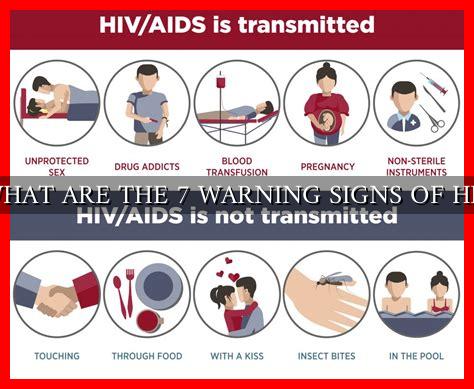-
Table of Contents
What Are the 7 Warning Signs of HIV
HIV, or Human Immunodeficiency Virus, is a virus that attacks the immune system and can lead to AIDS if left untreated. It is important to be aware of the warning signs of HIV so that early diagnosis and treatment can be initiated. Here are the 7 warning signs to look out for:
1. Flu-like Symptoms
One of the earliest signs of HIV infection is flu-like symptoms, such as fever, sore throat, and fatigue. These symptoms can occur within 2-4 weeks after exposure to the virus and may be mistaken for a common cold or flu.
2. Swollen Lymph Nodes
Swollen lymph nodes, particularly in the neck, armpits, or groin, can be a sign of HIV infection. Lymph nodes are an important part of the immune system and may become enlarged in response to an infection.
3. Skin Rash
A skin rash is a common symptom of HIV infection, typically appearing as red or purple bumps on the skin. The rash may be itchy and can occur on any part of the body.
4. Fatigue
Chronic fatigue is a common symptom of HIV infection, as the virus can affect the body’s ability to produce energy. People with HIV may experience persistent tiredness and lack of energy.
5. Weight Loss
Unexplained weight loss is a common sign of HIV infection, particularly in the later stages of the disease. HIV can affect the body’s ability to absorb nutrients, leading to weight loss and muscle wasting.
6. Night Sweats
Night sweats, particularly if they are severe and persistent, can be a warning sign of HIV infection. Night sweats are episodes of excessive sweating that occur during sleep and can be accompanied by fever.
7. Recurrent Infections
People with HIV are more susceptible to infections due to their weakened immune system. Recurrent infections, such as thrush, pneumonia, or skin infections, can be a sign of HIV infection.
Conclusion
It is important to be aware of the warning signs of HIV so that early diagnosis and treatment can be initiated. If you experience any of these symptoms, it is important to get tested for HIV. Early diagnosis and treatment can help manage the virus and improve quality of life. Remember, HIV is not a death sentence, and with proper medical care, people living with HIV can lead healthy and fulfilling lives.
For more information on HIV symptoms and treatment, visit the CDC website.





